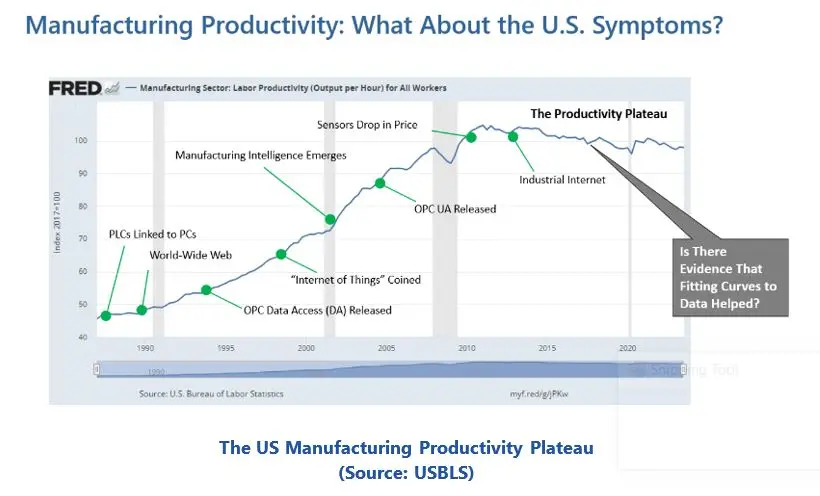

Keywords: Causal AI, Digital Transformation, Large Language Models, Generative AI, GenAI, Knowledge AI, ARC Advisory Group.
Business is changing fast; technology is changing even faster. Consequently, labor availability and skillset requirements are evolving and changing rapidly. Companies need to understand and implement technologies that allow them to adapt with agility. The process industries are challenged to continue to operate efficiently in an increasingly competitive environment. At the 2024 ARC Industry Forum in Orlando, ARC Advisory Group hosted a session with two end user presentations discussing the promise that a well-thought-out strategy leveraging causal AI can fulfill.
ARC introduced the difference between Causal AI and Generative AI and why the bigger promises of productivity are held in causal AI applications. After the introduction, Michael Carroll from Georgia-Pacific spoke first on understanding “Knowledge AI.” He was followed by Mike Tomasco, formerly with Pfizer, discussing his approach using Causal AI. A panel session that added Sandeep Chandran of Accenture and Sachin Misra with Kalypso: A Rockwell Automation Business, completed the session.
Michael Caroll began by pointing to a productivity graph from the US Bureau of Labor Statistics and highlighting a plateau of productivity since 2010. Carroll noted that this is about the time the internet of things became a focus, but the promise of IoT has not led to increased productivity. Industry has instead thrown technology at problems and has not reaped productivity gains.

Every enterprise has a purpose. Most people have heard of AGI (artificial general intelligence,) but Carroll believes that isn’t where companies should focus. Instead of trying to replicate the human brain, Carroll believes that companies should focus on making decisions for a purpose, and that purpose is for the enterprise. Companies should also endeavor to make these purposeful decisions automatically. Current market conditions require that companies make those decisions better and faster than they were made before.
However, companies are getting caught up with the hype. There’s a place for GenAI, because GenAI and Large Language Models (LLM) allow humans to interact with the computer. Most AI projects have been focused on analyzing past data and looking for correlations. Instead, companies need to move to “knowledge AI” that is based on understanding the causality behind the data and applying principles and models that allow automated reasoning. Knowledge AI understands the way the enterprise works.
According to Carroll, the basis of this effort is data AI. Then companies can layer Bayesian modeling above it that provides the ability to take the way companies think they understand things happen (the principles, why it’s in business, the physical models that the company operates through, and how things get done) and the things that the company participates in with the functions and processes that are proven rational and work. The combination of data AI and Bayesian modelling creates knowledge AI. This is causal, and now the organization understands the way things happen in your enterprise.
Carroll uses the term “agents” to describe knowledge AI models built for a specific business purpose or task. The term “agency” denotes the use of agents to aid humans in their tasks. Agents created for the purpose of the enterprise represent special purpose intelligence (SPI).
The future of enterprise decision making requires a platform that can orchestrate multiple SPI agents across different levels of the enterprise. These agents increase transparency across the enterprise because each agent encourages understanding of how work gets done in an explainable, referenceable, and documented manner. As an enterprise builds out agents across its business, it creates an orchestrated and distributed “agency.” This leads to improved connections with customers and assets without intermediaries. This doesn’t exist today, but it’s not because of a lack of technology. Carroll postulates that the problem is people. The reason he believes the productivity curve has flattened is because companies are still using people to do the work.
Facilitating special purpose intelligence is not easy. In fact, Georgia Pacific was incapable of implementing its AI strategy on its own. The company was helped by a team of experts, some of whom were sitting in the room. He invited the audience to learn from them and to collaborate with them. For those who have heard Carroll speak, he will usually point out the need to reach out and find peers that will enhance or accelerate your performance. He quotes his grandfather, “Show me your friends, and I’ll show you your future.”
ARC Advisory Group clients can view the complete report at the ARC Client Portal.
Please Contact Us if you would like to speak with the author.
Obtain more ARC In-depth Research at Market Analysis

